小学英语一般现在时态讲解及练习
一般现在时时态讲解及练习题
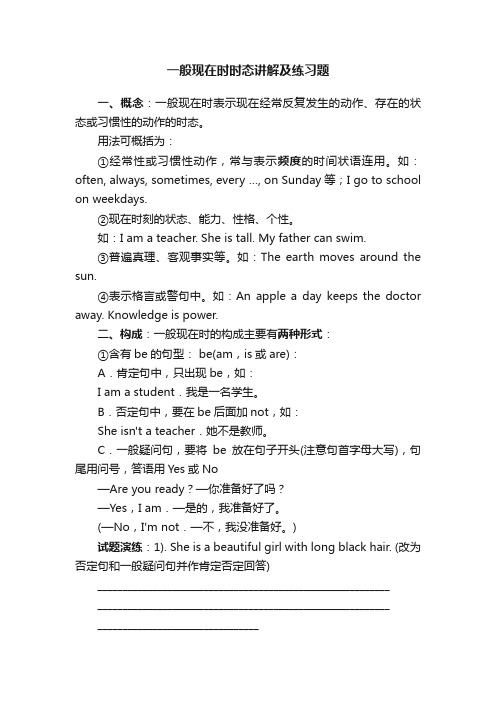
一般现在时时态讲解及练习题一、概念:一般现在时表示现在经常反复发生的动作、存在的状态或习惯性的动作的时态。
用法可概括为:①经常性或习惯性动作,常与表示频度的时间状语连用。
如:often, always, sometimes, every …, on Sunday等;I go to school on weekdays.②现在时刻的状态、能力、性格、个性。
如:I am a teacher. She is tall. My father can swim.③普遍真理、客观事实等。
如:The earth moves around the sun.④表示格言或警句中。
如:An apple a day keeps the doctor away. Knowledge is power.二、构成:一般现在时的构成主要有两种形式:①含有be的句型: be(am,is或are):A.肯定句中,只出现be,如:I am a student.我是一名学生。
B.否定句中,要在be后面加not,如:She isn't a teacher.她不是教师。
C.一般疑问句,要将be放在句子开头(注意句首字母大写),句尾用问号,答语用Yes或No—Are you ready?—你准备好了吗?—Yes,I am.—是的,我准备好了。
(—No,I'm not.—不,我没准备好。
)试题演练:1). She is a beautiful girl with long black hair. (改为否定句和一般疑问句并作肯定否定回答)____________________________________________________________________________________________________________________________________________________________________________________2). They are Chinese students. (同上)____________________________________________________________________________________________________________________________________________________________________________________② 实义动词型:句中的谓语动词为实义动词(也叫行为动词):A.肯定句中,只出现实义动词,如:I get up in the morning.我早晨起床。
一般现在时用法及专项练习

一般现在时(the simple present tense)一、定义是一种英语语法形式,表示规律性、通常性、习惯性、真理性的动作或状态。
二、结构(一)肯定句1. 主语 + be 动词(am/is/are)+ 其他。
例如:I am a student.(我是一名学生。
)2. 主语 + 动词原形。
例如:We play basketball on weekends.(我们在周末打篮球。
)3.主语(第三人称单数)+动词第三人称单数形式。
一般在动词词尾加 -s 或 -es。
例如:He plays football after school.(他放学后踢足球。
)Tom usually goes to school at 7:30.(汤姆通常7点半去学校。
)(二)否定句1. 主语 + be 动词(am/is/are)not +其他。
例如:I am not a student.(我不是一名学生。
)2. 主语 + do not(don’t) +动词原形。
例如:We do not play basketball on weekends.(我们周末不打篮球。
)3.主语(第三人称单数)does not(doesn’t )+动词原形。
例如:He does not play football after school.(他放学后不踢足球。
)(三)一般疑问句1. Be动词+主语+其他?例如:Is she a student?(她是学生吗?)2. Do/Does + 主语 + 动词原形?例如:Do you play football after school? (你放学后踢足球吗?)Does he work here? (他在这里工作吗?)三、用法1. 描述习惯或重复动作:常与表示频率的时间状语连用。
例如:I get up at 6 o'clock every morning. (我每天早上六点起床。
)He goes to school by bus. (他乘公共汽车上学。
小学英语时态讲解及练习可直接.docx

小学英语语法【一】一般现在时一般现在时基本用法介绍一、一般现在时的功能1.表示事物或人物的特征、状态。
如:The sky is blue.天空是蓝色的。
2.表示经常性或习惯性的动作。
如:I get up at six every day.我每天六点起床。
3.表示客观现实。
如: The earth goes around the sun.地球绕着太阳转。
一般现在时用法练习一、出下列动词的第三人称单数drink ________ go _______ stay________ make ________look _________ have_______ pass_______ carry ____ come________ watch______ plant_______fly ________study_______ brush________ do______ teach_______ likeplay read wash be二、用括号内动词的适当形式填空。
1.He often ________(have) dinner at home.2.Daniel and Tommy _______(be) in Class One.3.We _______(not watch) TV on Monday.4.Nick _______(not go) to the zoo on Sunday.5.______ they ________(like) the World Cup?6.What _______they often _______(do) on Saturdays?7._____ your parents _______(read) newspapers every day?8.The girl _______(teach) us English on Sundays.9.She and I ________(take) a walk together every evening.10.There ________(be) some water in the bottle.11.Mike _______(like) cooking.12.They _______(have) the same hobby.13.My aunt _______(look) after her baby carefully.14.You always _______(do) your homework well.15.I _______(be) ill. I’m staying in bed.16.She _______(go) to school from Monday to Friday.17.Liu Tao _______(do) not like PE.18.The child often _______(watch) TV in the evening.19.Su Hai and Su Yang _____(have) eight lessons this term.20. - What day _____(be) it today?-It’s Saturday.三、按照要求改写句子2.I do my homework every day.(改为一般疑问句,作否定回答)_____________________________________________________3.She likes milk.(改为一般疑问句,作肯定回答)__________________________4.Amy likes playing computer games.(改为一般疑问句,作否定回答)___________________________________6.He speaks English very well.(改为否定句)_______________________________________________7.John comes from Canada.(对划线部分提问)_______________________一般现在时练习1. He often(have) dinner at home.2. Daniel and Tommy(be) in Class One.3. We(not watch) TV on Monday.4. Nick(not go) to the zoo on Sunday.5.they(like)the World Cup?6. What they often(do) on Saturdays?7.your parents(read)newspapers every day?8. The girl(teach)us English on Sundays.9. She and I(take) a walk together every evening.10. There(be) some water in the bottle.小学英语语法【二】现在进行时现在进行时1.现在进行时表示现在正在进行或发生的动作,也可表示当前一段时间内的活动或现阶段正在进行的动作。
一般现在时与现在进行时讲解及练习
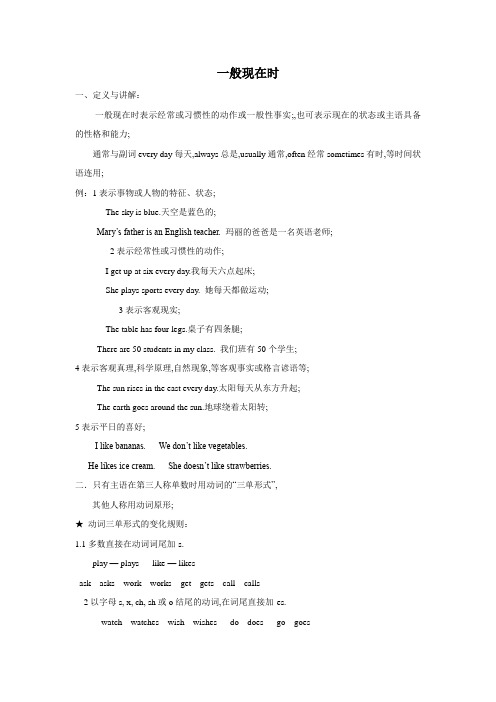
一般现在时一、定义与讲解:一般现在时表示经常或习惯性的动作或一般性事实;,也可表示现在的状态或主语具备的性格和能力;通常与副词every day每天,always总是,usually通常,often经常sometimes有时,等时间状语连用;例:1表示事物或人物的特征、状态;The sky is blue.天空是蓝色的;Mary’s father is an English teacher. 玛丽的爸爸是一名英语老师;2表示经常性或习惯性的动作;I get up at six every day.我每天六点起床;She plays sports every day. 她每天都做运动;3表示客观现实;The table has four legs.桌子有四条腿;There are 50 students in my class. 我们班有50个学生;4表示客观真理,科学原理,自然现象,等客观事实或格言谚语等;The sun rises in the east every day.太阳每天从东方升起;The earth goes around the sun.地球绕着太阳转;5表示平日的喜好;I like bananas. We don’t like vegetables.He likes ice cream. She doesn’t like strawberries.二.只有主语在第三人称单数时用动词的“三单形式”,其他人称用动词原形;★动词三单形式的变化规则:1.1多数直接在动词词尾加-s.play — plays like — likesask---asks work---works get---gets call---calls2以字母s, x, ch, sh或o结尾的动词,在词尾直接加-es.watch---watches wish---wishes do---does go---goes3以“辅音字母加- y”结尾的动词,要先变y为i再加-es.try---tries study---studies cry---cries fly---flies2.不规则变化:be---- is have----has三、一般现在时的句子转换:1变一般疑问句:当句子中有be动词或情态动词时,则把be动词或情态动词can,could等提到主语的前面,口诀:一调二变三问号;2变否定句:在be动词或情态动词后面直接加not变成否定句. be后not莫忘记例:①陈述句:She is my sister..疑问句→ Is she your sister Yes, I am./ No, I’m not.否定句→ She is not my si ster.②陈述句:I can play soccer.疑问句→ Can you play soccer Yes,Ican./ No, I can’t.否定句→ I can not /can’t play soccer.★注意:对一般疑问句的回答:一般用什么问就用什么来回答;但以下例外:Is this a pencil Yes , it is./ No, it isn’t.Is that your backpack Yes , it is./ No, it isn’t.Are these your parents Yes, they’re./ No, they aren’t.Are those Jim’s brothers Yes,they’re./ No, they aren’t.3当句子中没有be动词,也没有情态动词时,变一般疑问句时,在主语前加助动词do I, we, you,以及复数, does第三人称单数she,he,it等变成问句;4变否定句时,在主语后谓语动词前加助动词don’t, doesn’t变成否定句,切记:助动词后的动词则还原成动词原形;例:①陈述句:We get up起床at 7:00 every morning.疑问句→Do you get up at 7:00 every morning否定句→We don’t get up at 7:00 every morning.②陈述句:She has a brother.疑问句→ Does she have a brother否定句→ She doesn’t have a brother.※在一般现在时中,当主语是第三人称单数时,谓语动词要用第三人称单数形式,即常在动词原形后加-s或-es;但有些同学们对于哪些主语是第三人称单数还不十分清楚,现归纳总结如下:一、人称代词he, she, it是第三人称单数;如:He likes watching TV. 他喜欢看电视;She has lunch at twelve. 她十二点吃午餐;二、单个人名、地名或称呼作主语;是第三人称单数;如:①Han Mei likes salsd . 韩梅喜欢萨拉;②Beijing is in China. 北京在中国;③Uncle Wang often plays volleyball.. 王叔叔经常打排球;三、单数可数名词或"this / that / the+单数可数名词"作主语时,是第三人称单数;如:②This book is yours. 这本书是你的;③That car is red. ④The cat is Lucy's. 这只猫是露茜的;四、不定代词someone, somebody, nobody, everything, something等及指示代词this, that作主语时,是第三人称单数;①Everyone is here. 大家到齐了;②There is a watch on the table. 桌上有块手表;③This is a pen. 这是一支钢笔;④That is an eraser.五、不可数名词作主语时为第三人称单数;如:①The milk牛奶is in the glass. 牛奶在玻璃杯里;②The bread is very small. 那面包很小;六、当数字或字母作主语时,看作第三人称单数;如:①"6" is a lucky number. "6"是个吉利数字;②"I" is a letter. "I"是个字母;一、按照要求改写句子1.This is my pencil 变一般疑问句your pencil 2. These red socks are Kate’s . 变一般疑问句socks Kate’s3. Mary does not have any books . 变肯定句some books .4. She likes theblack bag very much . 变为否定句5. I like apples. 用she改写句子6. It’s an English dictionary . 对画线部分提问. 7. He has hamburger and apples for dinner . 变一般疑问句二、用Be动词填空;1. you Li Fen No, not .2. Mr. green very busy Yes , he .3..This book very interesting .4. What class you in5. You and I good friends .6. The basketball club fun .三.用所给动词的适当形式填空;1. Lin Tao like his ruler .2. Let’s have ice cream .3. Let’s play tennis4. He like English.5. Nice meet you6. I need some fruits.一般现在时用法专练:一、写出下列动词的第三人称单数形式;have like drink _____ go _____ stay ____ study___ _ teach_____make ______look ______have____ come_____ watch______ plant_____ fly _____ do_____ 二、用括号内动词的适当形式填空;1. He often ________have dinner at home.2. Daniel and Tommy _______be in Class One.3. We_______not watch TV on Monday.4. Nick ____ ___not go to the zoo on Sunday.5. ______ they ________like pears6. _______ your parents _______have eggs every day7. There ________be some water in the bottle.18. Mike _______like cooking.9. They _______have the same hobby.10. Liu Tao ______ _do not like PE.11. This boy often _______watch TV in the evening.五、改错划出错误的地方,将正确的写在横线上1. Is your brother speak English __________________2. Does he likes going fishing ________________3. He likes play games after class. _______________ __4. Mr. Wu teachs us English. _______________5. She don’t do her homework on Sundays. _____________一般现在时态句型转换1.This is a white key. 对画线部分进行提问2.B en’s bag is yellow and red . 对画线部分进行提问3.Her name is Gina. 对画线部分进行提问4.My phone number is 673-8220. 对画线部分进行提问5.The boy’s name is Jack. 对画线部分进行提问6.The picture is on the wall. 对画线部分进行提问7.Your baseball is under the chair. 对画线部分进行提问8.His book is on the desk. 对画线部分进行提问9.Some balls are in the dresser. 对画线部分进行提问10.My computer is on my desk. 对画线部分进行提问11.He is Johnny. 改为一般疑问句12.These are his parents. 改为一般疑问句13.This is my sister. 改为一般疑问句baseball is under the bed. 改为一般疑问句key is on the bed. 改为一般疑问句has a tennis racket. 改为一般疑问句have some baseball bats. 改为一般疑问句has many things to do today. 改为一般疑问句like hamburgers . 改为一般疑问句have a TV. 改为一般疑问句are Tina. 改为否定句are my brothers. 改为否定句books are on the bookcase. 改为否定句books are under the desk. 改为否定句has a computer game. 改为否定句have a big TV in our house. 改为否定句has some money in her pocket. 改为否定句likes ice cream. 改为否定句to meet you 写出答语35.Is that a dictionary 改为复数句____________________________________________36These are photos. 改为单数句he your cousin 作肯定回答Linda his sister 作否定回答this a Chinese book 作否定回答are dictionaries. 改为单数句the CD on the sofa 作肯定回答the chairs next to the table 作否定回答is my book 改为复数句子are on the sofa . 改为单数句子现在进行时现在进行时是由“助动词beam, is, are+动词-ing”构成,表示说话者“此刻”或现阶段的行为;二、现在进行时的基本结构1.肯定句:主语+beam, is, are+现在分词+…… 例如:I am speaking with him on the phone. 我正和他通电话;He is playing tennis. 他正在打网球; My parents are dancing. 我父母正在跳舞;2.否定句:主语+be not+现在分词+…… 例如:I'm not studying. 我没在学习; She is not reading now. 现在她不是在看书;They are not writing. 他们没在写;3.一般疑问句:Be动词+主语+现在分词+…… 例如:1— Is she still helping Li Ling她还在帮助李玲吗— Yes, she is. 是的;/No, she isn't. 不,她没在帮李玲;2— Are you listening to music 你正在听音乐吗— Yes, I am. 是的;/No, I'm not. 不,我没有听音乐;4.特殊疑问句:特殊疑问词+be动词+主语+现在分词+…… 例如:— What are you studying 你正在学什么— I'm studying English. 我在学英语;— What is Mike doing 迈克在做什么----He is watching the football match. 他在看足球比赛;三、现在分词的变化规则1.一般在动词末尾加ing,如:think-thinking go-going2.以不发音字母e结尾的动词,先去掉e,再加ing,如:come-coming make-making3.以重读闭音节结尾的动词,中间只有一个元音字母,词尾只有一个辅音字母,应双写末尾的辅音字母,再加ing, 如:put-putting run-running四、现在进行时的基本用法1.表示此时此刻说话者正在进行的动作;例如:The teacher is talking with his students. 这位老师正在同他的学生交谈;What are you doing now 你现在干什么呢2.表示现阶段正在进行的动作,但此刻并不一定在进行; 例如:We are doing an experiment this week. 我们这个星期正在做一个实验;但说话时并不一定在做实验;3.现在进行时有时可用来表示将来发生的动作,这一用法常用于go, come, leave, start 等短暂性动词,后面也常用表示较近的将来时间状语如tomorrow, tonight, this morning/Friday 等,表示安排或计划好的事情;例如:We are leaving for Shanghai tomorrow. 我们明天启程去上海;4.现在进行时表示说话时正发生的或者正进行的动作;常与时间状语now , at the moment 等连用;It is raining hard now . Don't hurry .I am writing a letter . Will you please turn down the radioWatch out 当心It's falling .Look The clouds are gathering .Look at this picture of a busy railway station . A train is standing at one of the platforms ready to leave . Some of thepassengers are looking out of the windows watching the late-comers who are hurrying along looking for empty seats .We are busy at the moment . I'm selling cigarettes . My father is selling some sweets .5.表示按计划、安排将要发生的动作;We are going to Rome next week . Mr Black is leaving for Shanghai in a few days .Are you doing anything special tonight6.用在时间和条件状语从句中表达将来正进行的动作;I'll telephone you tomorrow while I'm waiting .I'll think about it while you are writing the report .When you are talking with him , take care not to mention this .If you are standing at the corner when I pass , I'll give you a lift into town .五、现在进行时的练习题按要求改写句子The boy is playing basketball.否定句:____________________________一般疑问句:_________________________ 肯定回答:__________________________ 否定回答:__________________________ 对“is playing basketball”提问:__________________________对“ The boy”提问:__________________________They are singing in the classroom.否定句:____________________________ 一般疑问句:_________________________ 肯定回答:__________________________ 否定回答:__________________________ 对“are singing ”提问:__________________________对“ in the classroom”提问:__________________________,the window ,open, now.用现在进行时连词成句._____________________birds are singing in the tree.就划线部分提问________________________,who,the window, cleaning连词成句______________________7. The children are playing games near the house.就划线部分提问_______________is closing the door now.改成否定句______________________are doing your homework.用“I”作主语改写句子______________________,the tree, sing, now, under.用现在进行时连词成句._____________________Young Pioneers are helping the old woman.改成一般疑问句______________________II.单项选择1.我在照看孩子.AI am looking after the baby. BI'm look aftering the baby.CI look am aftering the baby. DI looking after the baby.'s making ______a kite.AI, me BMy, my CMy, me DHis, his the woman ______ yellow your teacherAin Bputting on Cwearing DhavingThe twins _____their mother do the housework.Aare wanting Bhelp Care helping Dare looking the birds doing They are singing in a tree.AWho BWhat CHow DWhere she ____somethingAeat Beating Ceatting Deats7.你在干什么AWhat is you doing BWhat are you doCWhat are you doing DWhat do you doare you listening_____A/Bfor Cat Dto9.我正在听他说话.AI listening to him.BI'm listening to him.CI'm listen to him.DI'm listening him.are ____their clothes.Amakeing Bputting Cput away Dputting on III.用现在进行时完成下列句子:do sing an English song.mend mend a car.fly a kite Yes ,_______.sit in the boatask questionsplay games now.man______________work near the house now.。
一般现在时态讲解及练习(精简版,错题版)

一般现在时态一、一般现在时的用法1) 表示经常性、习惯性的动作或存在的状态。
通常与副词sometimes, often, usually, always, everyday (year, month ), once (twice, three times) a day, 等等频率副词(时间状语)连用。
e.g. They usually go to school by bike.I take the medicine three times a day. 实义动词表示“动作”She helps her mother once a week.Mary’s father is a policeman.There are 50 students in my class. Be动词表示“状态”He is very busy now.be 、do不能放一起,如果非要放一起,do后要加ing, 变成现在进行时。
2) 表示主语的特征、性格、爱好等。
e.g. I work hard.I like watching TV.3) 表示客观真理e.g. There are seven days in a week.The moon moves round the earth.The sun rises in the east and sets in the west every day.Tomorrow is Tuesday.二、一般现在时的句子转换:三、一般现在时的结构:“主语+谓语+其它”,有时为了起强调作用,时间状语也可提前.三单变化:1)多数在动词后+s :play — plays like — likes ask---asks work---works get---gets stay---stays 2)以字母s, x, ch, sh或o结尾的动词,+-es:watch---watches wish---wishes fix---fixes do---does go---goes pass---passes 3)以“辅音字母加- y”结尾的动词,要先变y为i+-es.try---tries study---studies cry---cries fly---flies不规则变化:be---- is are have----has做题时常见错误如下:1)、be动词与行为动词同时出现在句子中例:We are plant (plant) the trees in spring.答案:plant2)、单三人称形式易出错例:1 He plaies (play) football very well.2 Danny gos (go) to school at 7:10.答案:1 plays 2 goes解析:1以辅音字母加y结尾的动词变单三人称形式才能把y换成i再加es;2与名词变复数不同,变单三人称形式以o结尾的词要加es.3)、在句式变换时易出错例:1 Does Jenny has (has) a good friend?2 Brian doesn’t lives (not live) in China.答案:1 Does have 2 doesn’t live解析:口诀:“见助动,用原形”。
完整版PEP小学英语时态讲解和练习.doc
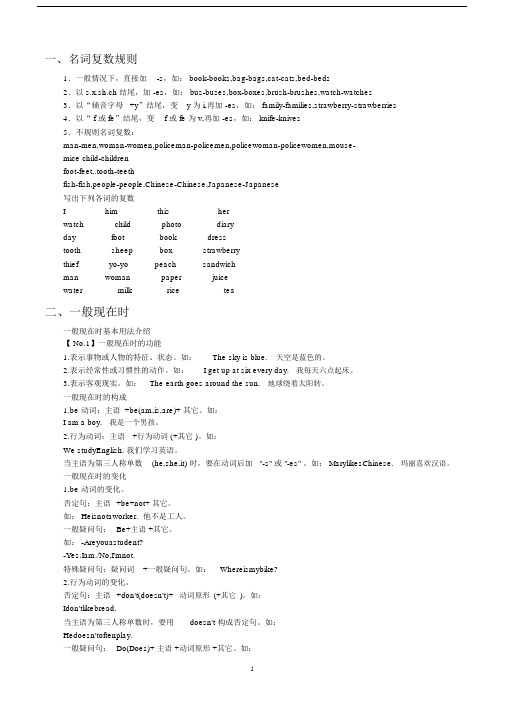
一、名词复数规则1.一般情况下,直接加-s,如: book-books,bag-bags,cat-cats,bed-beds2.以 s.x.sh.ch 结尾,加 -es,如: bus-buses,box-boxes,brush-brushes,watch-watches3.以“辅音字母+y”结尾,变y 为 i,再加 -es,如: family-families,strawberry-strawberries4.以“ f 或 fe”结尾,变 f 或 fe 为 v,再加 -es,如: knife-knives5.不规则名词复数:man-men,woman-women,policeman-policemen,policewoman-policewomen,mouse-mice child-childrenfoot-feet,.tooth-teethfish-fish,people-people,Chinese-Chinese,Japanese-Japanese写出下列各词的复数I_________him_________this___________her______watch_______child_______photo________diary______day________foot________book_______dress________tooth_______sheep______box_______strawberry_____thief_______yo-yo______peach______sandwich______man______woman_______paper_______juice___________water________milk________rice__________tea__________二、一般现在时一般现在时基本用法介绍【 No.1】一般现在时的功能1.表示事物或人物的特征、状态。
小学英语语法一般现在时(包括练习)
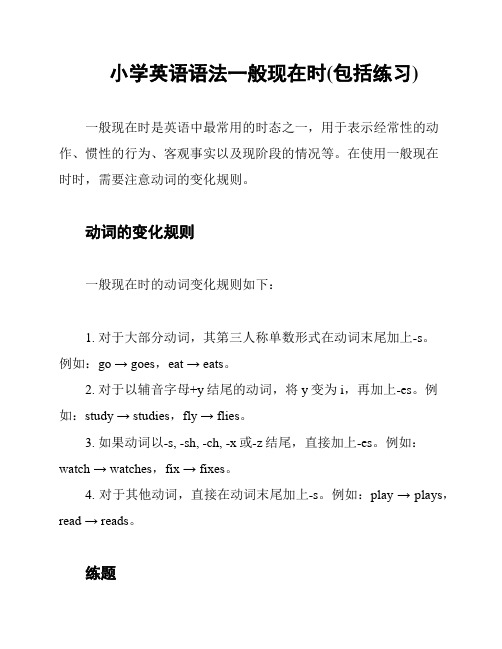
小学英语语法一般现在时(包括练习)一般现在时是英语中最常用的时态之一,用于表示经常性的动作、惯性的行为、客观事实以及现阶段的情况等。
在使用一般现在时时,需要注意动词的变化规则。
动词的变化规则一般现在时的动词变化规则如下:1. 对于大部分动词,其第三人称单数形式在动词末尾加上-s。
例如:go → goes,eat → eats。
2. 对于以辅音字母+y结尾的动词,将y变为i,再加上-es。
例如:study → studies,fly → flies。
3. 如果动词以-s, -sh, -ch, -x或-z结尾,直接加上-es。
例如:watch → watches,fix → fixes。
4. 对于其他动词,直接在动词末尾加上-s。
例如:play → plays,read → reads。
练题请根据句子的语境,用适当的动词形式填空。
每个空格只填一个单词。
1. Peter ___________ (like) to play basketball with his friends every weekend.2. My mother ___________ (work) as a nurse in the hospital.3. The cat ___________ (sleep) on the sofa most of the day.4. We ___________ (watch) movies at the cinema every Friday night.5. Sarah ___________ (brush) her teeth twice a day.参考答案1. Peter likes to play basketball with his friends every weekend.2. My mother works as a nurse in the hospital.3. The cat sleeps on the sofa most of the day.4. We watch movies at the cinema every Friday night.5. Sarah brushes her teeth twice a day.以上是关于小学英语语法一般现在时以及练习题的内容。
小学六年级上册英语时态精讲练习

小学六年级上册英语时态精讲练习第一部分:一般现在时一般现在时表示现在的状态或惯性动作。
例子:1. I am a student. (我是一个学生。
)am a student. (我是一个学生。
)2. We play football every Sunday. (我们每个星期天都踢足球。
)play football every Sunday. (我们每个星期天都踢足球。
)练题:1. She often __(do)__ her homework at night. (她经常在晚上做作业。
)2. They __(be)__ my good friends. (他们是我好朋友。
)第二部分:现在进行时现在进行时表示现在正在进行的动作或状态。
例子:1. She is reading a book. (她正在看书。
)is reading a book. (她正在看书。
)2. I am doing my homework. (我正在做作业。
)am doing my homework. (我正在做作业。
)练题:1. They __ (play)__ football now.(他们现在正在踢足球。
)2. She __ (read)__ a book at the moment.(她现在正在看书。
)第三部分:一般过去时一般过去时表示过去发生的动作或状态。
例子:1. I was in Beijing last year. (我去年在北京。
)was in Beijing last year. (我去年在北京。
)2. We went to the park yesterday. (我们昨天去了公园。
)went to the park yesterday. (我们昨天去了公园。
)练题:1. He __ (be)__ at home last night.(他昨晚在家。
)2. They __ (go)__ to the cinema last weekend.(他们上周末去了电影院。
一般现在时讲解及练习(含答案)

一般现在时讲解及练习(含答案)一、单项选择一般现在时1.If he ________ exercise, he______ healthy.A.not; will B.isn’t; won’t beC.doesn’t; will be D.doesn’t do; won’t be【答案】D【解析】【详解】考查if条件句中的时态。
句意:如果他不做运动,他就不会健康。
If条件句,如果主句用一般将来时态,则从句用一般现在时态,且句子主语是he,单数第三人称,故选D。
2.Whene ver you ______ a present, you’d better think about it from the receiver’s preference. A.bought B.buy C.will buy D.have bought【答案】B【解析】试题分析:句意:每当你买礼物的时候,你最好从接收方的偏好想一想。
whenever引导的让步状语从句,采用一般现在时表将来的用法。
故选B。
考点:考查动词的时态。
3.The Dragon Boat Festival ________ the beginning of the hottest season of the year.A.is marking B.marks C.will mark D.marked【答案】B【解析】试题分析:考查时态。
一般现在时表示经常性习惯性的行为。
本句中使用一般现在时端午节标志着一年中最热的季节的开始。
故B正确。
考点:考查时态4.That’s why I help brighten people’s days. If you ________, who’s to say that anothe r person will?A.didn’t B.don’tC.weren’t D.haven’t【答案】B【解析】【详解】考查条件状语从句中动词的时态。
英语一般现在时全面讲解(附练习及答案)
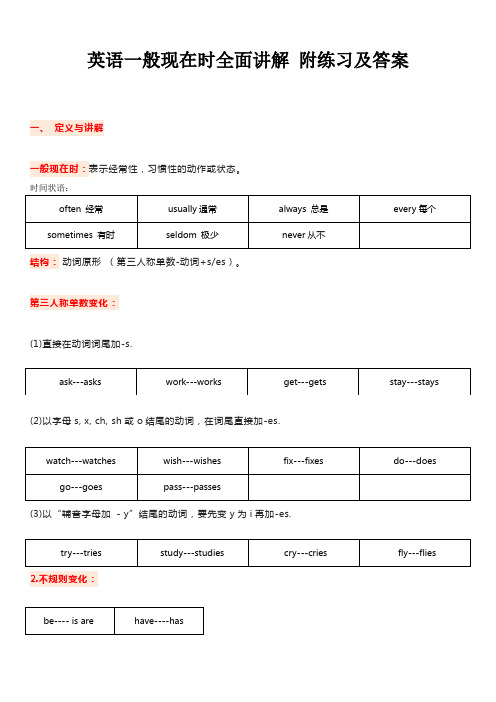
英语一般现在时全面讲解附练习及答案一、定义与讲解一般现在时:表示经常性,习惯性的动作或状态。
结构:动词原形(第三人称单数-动词+s/es)。
第三人称单数变化:(1)直接在动词词尾加-s.(2)以字母s, x, ch, sh或o结尾的动词,在词尾直接加-es.(3)以“辅音字母加- y”结尾的动词,要先变y为i再加-es.2.不规则变化:二、一般现在时用法1. 表示经常性,习惯性,永久性的动作或存在的状态.通常与副词sometimes, often, usually, always, every day (year, month ), once (twice, three times) a day,等时间状语连用。
2. 表示客观真理,科学原理,自然现象,等客观事实或格言,谚语等。
三、一般现在时的句子转换:(1)当句子中有be动词或情态动词时,则把be动词或情态动词(can,could等等)提到主语的前面变成疑问句;在be动词或情态动词后面加not变成否定句.(2)当句子中即没有be动词,也没有情态动词时,则在主语前加助动词do (you,以及复数), does(单数she,he,it)变成问句;在主语后谓语动词前加助动词don’t(I,you,以及复数), doesn’t(单数she,he,it)变成否定句,助动词后的动词要变成动词原形。
名师解析1.________ you often ________ tea?A.Do;drinks B.Does;drink C.Do;drink分析:你经常喝茶吗?根据often可知句子为一般现在时,主语为you,用助动词Do提问,动词用原形,C 符合题意,故选C。
2.My legs .A.hurt B.hurts C.hurting分析:我的腿……。
A痛,动词原形;B痛,动词单三形式,主语是名词复数,谓语动词用原形,排除;C痛,现在分词,用于现在进行时,构成be doing,缺少be,排除。
一般现在时讲解及练习
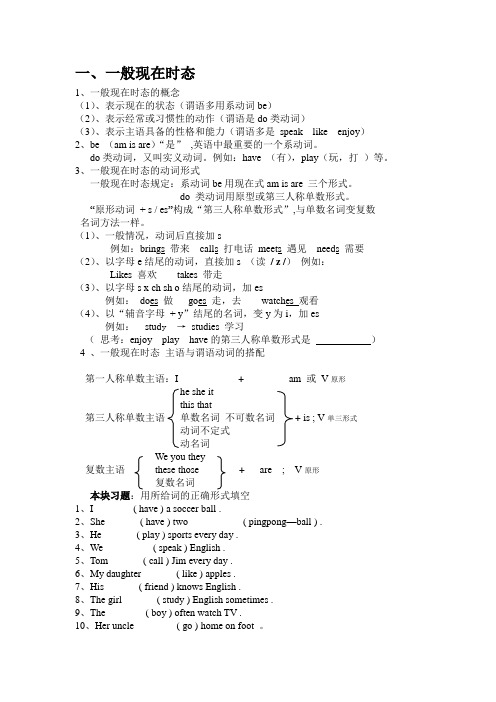
一、一般现在时态1、一般现在时态的概念(1)、表示现在的状态(谓语多用系动词be)(2)、表示经常或习惯性的动作(谓语是do类动词)(3)、表示主语具备的性格和能力(谓语多是speak like enjoy)2、be (am is are)“是”,英语中最重要的一个系动词。
do类动词,又叫实义动词。
例如:have (有),play(玩,打)等。
3、一般现在时态的动词形式一般现在时态规定:系动词be用现在式am is are 三个形式。
do 类动词用原型或第三人称单数形式。
“原形动词+ s / es”构成“第三人称单数形式”,与单数名词变复数名词方法一样。
(1)、一般情况,动词后直接加s例如:brings 带来calls 打电话meets 遇见needs 需要(2)、以字母e结尾的动词,直接加s (读/ z /)例如:Likes 喜欢takes 带走(3)、以字母s x ch sh o结尾的动词,加es例如:does 做goes 走,去watches 观看(4)、以“辅音字母+ y”结尾的名词,变y为i,加es例如:stud y →studies 学习(思考:enjoy play have的第三人称单数形式是)4 、一般现在时态主语与谓语动词的搭配第一人称单数主语:I +am 或V原形he she itthis that第三人称单数主语单数名词不可数名词+ is ; V单三形式动词不定式动名词We you they复数主语these those + are ; V原形复数名词本块习题:用所给词的正确形式填空1、I _______ ( have ) a soccer ball .2、She ______ ( have ) two __________ ( pingpong—ball ) .3、He ______ ( play ) sports every day .4、We ______ ( speak ) English .5、Tom ______ ( call ) Jim every day .6、My daughter ______ ( like ) apples .7、His ______ ( friend ) knows English .8、The girl ______ ( study ) English sometimes .9、The _______ ( boy ) often watch TV .10、Her uncle ______ ( go ) home on foot 。
小学英语:一般现在时时态结构练习和全面解析-7

一般现在时语法专项突破1.—What do you have on Mondays?—I Chinese and English on Mondays.A.have B.am C.has全面分析:—星期一你有什么课?—星期一我汉语和英语。
本句用一般现在时,主语是第一人称,谓语用动词原形,选项A有,动词原形,选项B是,选项C有,单三,故选A.2.The cat ________ fish.A.likes B.like C.doesn't likes全面分析:猫鱼。
A喜欢,动词单三形式;B喜欢,动词原形;C格式错误,助动词不能与动词单三形式搭配;根据主语cat是名词单数,谓语动词用单三形式,故选A.3.当你把一样东西给对方时,可以说:A.Here you are.B.Here are you.全面分析:当把一样东西给对方时,可以说“给你”,给你的英文表达“Here you are.”故选A .4.Tom and his mother often to a park.A.goes B.go C.going全面分析:汤姆和他的妈妈经常公园。
A:去,单三式;B:去,原形,C:去,现在分词。
often经常,说明去公园的动作经常发生,句子时态用一般现在时。
Tom and his mother汤姆和他的妈妈是两个人,动词用原形,故答案为B。
5.She _____Bus NO. 12 to Spring Street.A.taking B.take C.takes全面分析:她乘坐12路公交车去春天街。
该句子是一般现在时,主语she是第三人称单数,因此谓语动词也要用第三人称单数形式,故选C。
6.Did you have_____books?A.some B.any C.a little D.much全面分析:你有些书吗?A. 一些(既可以修饰可数名词也可以修饰不可数名词,一般用在肯定句中);B. 一些/(既可以修饰可数名词也可以修饰不可数名词,一般用在疑问句和否定句中);C.一点(修饰不可数名词);D.很多的(修饰不可数名词);由于本句子是一般疑问句,该空后面是复数名词books ,故选B。
小学英语一般现在时态讲解及练习
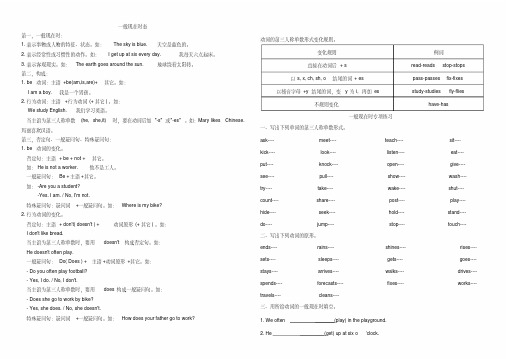
一般现在时态第一,一般现在时:1.表示事物或人物的特征、状态。
如:The sky is blue.天空是蓝色的。
2.表示经常性或习惯性的动作。
如:I get up at six every day.我每天六点起床。
3.表示客观现实。
如:The earth goes around the sun.地球绕着太阳转。
第二,构成:1. be动词:主语+be(am,is,are)+其它。
如:I am a boy.我是一个男孩。
2.行为动词:主语+行为动词(+其它)。
如:We study English.我们学习英语。
当主语为第三人称单数(he, she,it)时,要在动词后加"-s"或"-es"。
如:Mary likes Chinese.玛丽喜欢汉语。
第三,否定句、一般疑问句、特殊疑问句:1. be动词的变化。
否定句:主语+ be + not +其它。
如:He is not a worker.他不是工人。
一般疑问句:Be +主语+其它。
如:-Are you a student?-Yes. I am. / No, I'm not.特殊疑问句:疑问词+一般疑问句。
如:Where is my bike?2.行为动词的变化。
否定句:主语+ don't( doesn't ) +动词原形(+其它)。
如:I don't like bread.当主语为第三人称单数时,要用doesn't构成否定句。
如:He doesn't often play.一般疑问句:Do( Does ) +主语+动词原形+其它。
如:- Do you often play football?- Yes, I do. / No, I don't.当主语为第三人称单数时,要用does构成一般疑问句。
如:- Does she go to work by bike?- Yes, she does. / No, she doesn't.特殊疑问句:疑问词+一般疑问句。
小学英语:一般现在时时态结构练习和全面解析

一般现在时语法专项突破1.January is the ________ month in a year.A.one B.a C.first全面分析:一月是一年中的第一个月。
第几个月需要序数词,选项A和B都是基数词,故选C。
2.It____a short tail.A.has B.have C.is D.are全面分析:它有一条短尾巴。
A. 有(第三人称单数形式);B. 有(动词原形)C.是(第三人称单数),D.是(复数)。
主语it是第三人称单数,因此谓语动词也要用第三人称单数形式,该句子表达“拥有”,故选A。
3.My sister ______ to school early every morning.A.go B.went C.goes全面分析:我妹妹每天早上都很早上学。
every morning每天早上,是一般现在时的时间状语,主语是第三人称单数,谓语动词用单三形式,A去,动词原形;B去,动词过去式;C去,动词单三形式。
故选C.4.This is Guo Yang. He ____ playing the erhu.A.like B.likes C.have全面分析:我是郭阳。
他拉二胡。
A喜欢,动词原形;B喜欢,动词单三形式;C有,动词原形,本句主语是第三人称单数,谓语动词用单三形式。
故选B。
5.Lily _____ playing baseball.A.like B.don't like C.doesn't like全面分析:莉莉打篮球。
A喜欢,动词原形,本句主语是第三人称单数,谓语动词用单三形式,排除;B不喜欢,本句主语是第三人称单数,助动词用doesn't,排除;C不喜欢。
故选C.6.Kitty and Alice are friends. They are in the class.A.same B.different C.all全面分析:Kitty 和Alice是朋友。
小学英语一般现在时知识点全面讲解附练习及答案
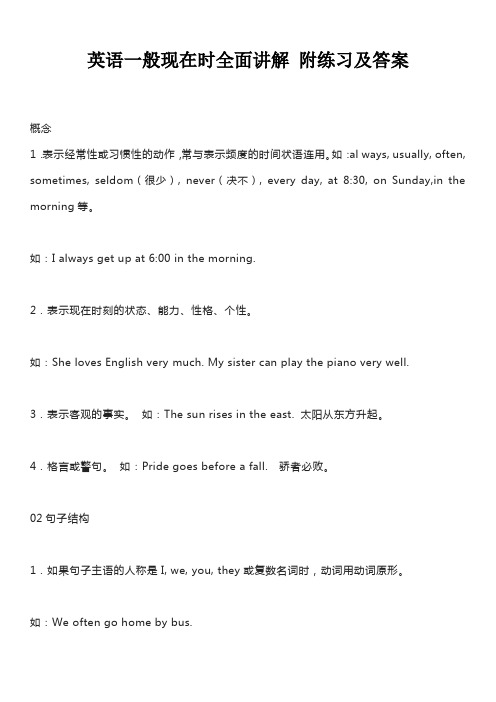
英语一般现在时全面讲解附练习及答案概念1.表示经常性或习惯性的动作,常与表示频度的时间状语连用。
如:al ways, usually, often, sometimes, seldom(很少), never(决不), every day, at 8:30, on Sunday,in the morning等。
如:I always get up at 6:00 in the morning.2.表示现在时刻的状态、能力、性格、个性。
如:She loves English very much. My sister can play the piano very well.3.表示客观的事实。
如:The sun rises in the east. 太阳从东方升起。
4.格言或警句。
如:Pride goes before a fall. 骄者必败。
02句子结构1.如果句子主语的人称是I, we, you, they或复数名词时,动词用动词原形。
如:We often go home by bus.2.如果句子的主语是第三人称单数,即:he, she, it 或单数名词时,动词要用第三人称的单数形式。
如:He often goes home by bus03动词的第三人称单数构成规则1.一般情况下在动词的后面直接加“s”;如:work→works play→plays¬ rain→rains see→sees visit→visits2.以o, x,s,sh, ch结尾的动词,在后面加“es”;如:do→does fix→fixes guess→guesses wash→washes teach→teaches3.以辅音字母加y结尾的动词,先把“y”改为“i”, 再加“es”;如:fly→flies study→studies carry→carries4.不规则变化。
如:have→has04注意在一般现在时的句子中,如果前面使用了助动词does, doesn’t, will, won’t, can, can’t, would, wouldn’t, must, mustn’t 等,尽管主语是第三人称单数,后面的动词用动词原形。
小学四种时态讲解及专项练习
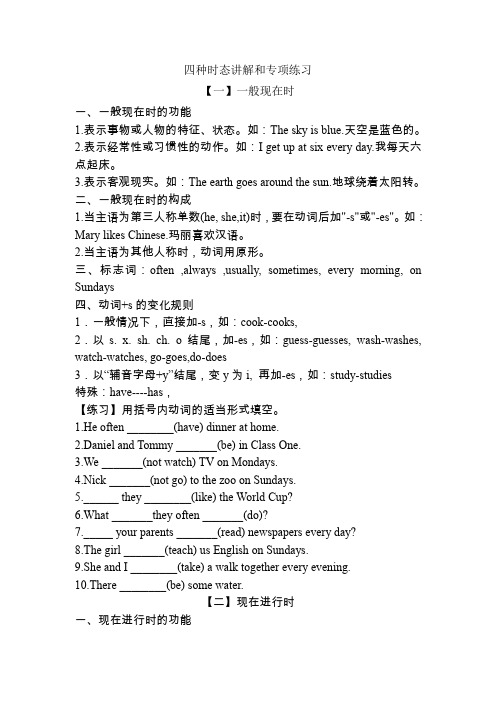
四种时态讲解和专项练习【一】一般现在时一、一般现在时的功能1.表示事物或人物的特征、状态。
如:The sky is blue.天空是蓝色的。
2.表示经常性或习惯性的动作。
如:I get up at six every day.我每天六点起床。
3.表示客观现实。
如:The earth goes around the sun.地球绕着太阳转。
二、一般现在时的构成1.当主语为第三人称单数(he, she,it)时,要在动词后加"-s"或"-es"。
如:Mary likes Chinese.玛丽喜欢汉语。
2.当主语为其他人称时,动词用原形。
三、标志词:often ,always ,usually, sometimes, every morning, on Sundays四、动词+s的变化规则1.一般情况下,直接加-s,如:cook-cooks,2.以s. x. sh. ch. o结尾,加-es,如:guess-guesses, wash-washes, watch-watches, go-goes,do-does3.以“辅音字母+y”结尾,变y为i, 再加-es,如:study-studies特殊:have----has,【练习】用括号内动词的适当形式填空。
1.He often ________(have) dinner at home.2.Daniel and Tommy _______(be) in Class One.3.We _______(not watch) TV on Mondays.4.Nick _______(not go) to the zoo on Sundays.5.______ they ________(like) the World Cup?6.What _______they often _______(do)?7._____ your parents _______(read) newspapers every day?8.The girl _______(teach) us English on Sundays.9.She and I ________(take) a walk together every evening.10.There ________(be) some water.【二】现在进行时一、现在进行时的功能现在进行时表示现在正在进行或发生的动作,也可表示当前一段时间内的活动或现阶段正在进行的动作。
一般过去时现在进行时一般现在时时态讲解、练习

3.末尾只有一个元音字母和一个辅 音字母的重读闭音节,应双写末尾的辅 音字母,再加-ed,如:stop-stopped 4.以“辅音字母 +y”结尾的,变y 为i, 再加-ed,如:study-studied
am,is-was, are-were, do-did, seesaw, say-said, give-gave, get-got, gowent, come-came, have-had, eat-ate, take-took, run-ran, sing-sang, putput, make-made, read-read, writewrote, draw-drew, drink-drank, swimswam, sit-sat ,sweep-swept
I didn’t go to school yesterday.
_______________________________________________
Did she play volleyball just now.
3、特殊疑问句由疑问词+did+主语+动词原形组成。
如:They visited the farm last Sunday.(对划线部分提问)
did danced does_________ dance________ worried asked worry________ ask _____ ate tasted taste_________ eat__________ put put ______ passed do kicked kick_________ pass_______ did ________
Where did they visit the farm? ____________________________________________
(完整版)一般现在时的讲解及练习题
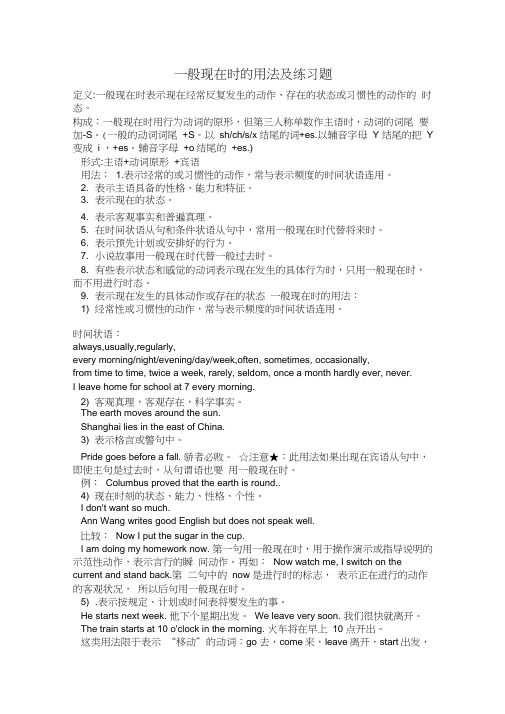
一般现在时的用法及练习题定义:一般现在时表示现在经常反复发生的动作、存在的状态或习惯性的动作的时态。
构成:一般现在时用行为动词的原形,但第三人称单数作主语时,动词的词尾要加-S。
(一般的动词词尾+S。
以sh/ch/s/x结尾的词+es.以辅音字母Y 结尾的把Y 变成i ,+es。
辅音字母+o结尾的+es.)形式:主语+动词原形+宾语用法: 1.表示经常的或习惯性的动作,常与表示频度的时间状语连用。
2. 表示主语具备的性格、能力和特征。
3. 表示现在的状态。
4. 表示客观事实和普遍真理。
5. 在时间状语从句和条件状语从句中,常用一般现在时代替将来时。
6. 表示预先计划或安排好的行为。
7. 小说故事用一般现在时代替一般过去时。
8. 有些表示状态和感觉的动词表示现在发生的具体行为时,只用一般现在时,而不用进行时态。
9. 表示现在发生的具体动作或存在的状态一般现在时的用法:1) 经常性或习惯性的动作,常与表示频度的时间状语连用。
时间状语:always,usually,regularly,every morning/night/evening/day/week,often, sometimes, occasionally,from time to time, twice a week, rarely, seldom, once a month hardly ever, never.I leave home for school at 7 every morning.2) 客观真理,客观存在,科学事实。
The earth moves around the sun.Shanghai lies in the east of China.3) 表示格言或警句中。
Pride goes before a fall. 骄者必败。
☆注意★:此用法如果出现在宾语从句中,即使主句是过去时,从句谓语也要用一般现在时。
例:Columbus proved that the earth is round..4) 现在时刻的状态、能力、性格、个性。
- 1、下载文档前请自行甄别文档内容的完整性,平台不提供额外的编辑、内容补充、找答案等附加服务。
- 2、"仅部分预览"的文档,不可在线预览部分如存在完整性等问题,可反馈申请退款(可完整预览的文档不适用该条件!)。
- 3、如文档侵犯您的权益,请联系客服反馈,我们会尽快为您处理(人工客服工作时间:9:00-18:30)。
一般现在时态第一,一般现在时:1. 表示事物或人物的特征、状态。
如:The sky is blue. 天空是蓝色的。
2. 表示经常性或习惯性的动作。
如:I get up at six every day. 我每天六点起床。
3. 表示客观现实。
如:The earth goes around the sun. 地球绕着太阳转。
第二,构成:1. be 动词:主语+be(am,is,are)+ 其它。
如:I am a boy. 我是一个男孩。
2. 行为动词:主语+行为动词什其它)。
如:We study English. 我们学习英语。
当主语为第三人称单数(he, she,it) 时,要在动词后加"-s"或"-es"。
女口:Mary likes Chinese. 玛丽喜欢汉语。
第三,否定句、一般疑问句、特殊疑问句:1. be动词的变化。
否定句:主语+ be + not + 其它。
女口:He is not a worker. 他不是工人。
一般疑问句:Be +主语+其它。
女口:-Are you a student?-Yes. I am. / No, I'm not.特殊疑问句:疑问词+—般疑问句。
如:Where is my bike?2. 行为动词的变化。
否定句:主语+ don't( doesn't ) + 动词原形什其它)。
如:I don't like bread.当主语为第三人称单数时,要用doesn't构成否定句。
如:He doesn't often play.一般疑问句:Do( Does ) +主语+动词原形+其它。
如:-Do you often play football?-Yes, I do. / No, I don't.当主语为第三人称单数时,要用does构成一般疑问句。
如:-Does she go to work by bike?-Yes, she does. / No, she doesn't.特殊疑问句:疑问词+—般疑问句。
如:How does your father go to work?、写岀下列单词的第三人称单数形式ask—meet---- teach—sit---- kick—look—listen---- eat—put---- knock—open---- give----see---- pull---- show---- wash—try---- take—wake—shut---- count---- share---- post---- play—hide---- seek—hold---- stand—do---- jump---- stop---- touch----二、写岀下列动词的原形。
ends---- rains—shines---- rises---- sets---- sleeps---- gets---- goes---- stays—arrives—walks—drives---- spends---- forecasts---- fixes---- works—travels---- cleans----三、用所给动词的一般现在时填空。
1. We often (play) in the playground.2. He (get) up at six o 'lock.3. __________ you ________ (brush) your teeth every morning?4. What ___________ do) he usually _______________ do) after school?5. Danny ______________ study) English, Chinese, Maths, Science, and Art an school.6. Mike sometimes _________________ go) to the park with his sister .7. At eight at night, she ___________________ atch) TV with his family.8. ____________ ike _________________ read) English every day?9. How many lessons _______________ your classmate ________________ h ave) on Monday? 10. What time ______________ his mother四、单项选择。
( )1. ________ you have a book? A. DoA. workingB. is workC. work( )3. Does Peter like to watch TV?五、 变否定句。
1. He wants a book. ____________________________________________2. Jimmy washes hands before dinner. ______________________________________3. Lisa likes milk very much. ____________________________________________4. They walk to school. ___________________________________________5. Lin gli ng and Dandan are 10 years old. ___________________________________6. I am Chinese. ____________________________________________7. Ben is from America. ___________________________________________六、 变一般疑问句并作肯定和否定回答。
1. He wants a book. _____________________________________________2. Jimmy washes hands before dinner. ___________________________________________3. Lisa likes milk very much. ____________________________________________4. They walk to school ____________________________________________5. Lin gli ng and Dandan are 10 years old. ___________________________________________6. I am Chinese. ____________________________________________7. Ben is from America. ___________________________________________A. Yes, he likeB. No, he doesn 'C. Yes, he 'likeD. No, he likes her homework in the afternoon.C. does, goD. does, goes()6. Where 'my camera? I ____________ it.B. am not seeingC. can ' findD. can ' look at( )7. How _______ he go to work? He ________ to work by bike. A. does, go B. do, goes C. do, go D. does, goes( )8. ________ you usually late for school? No, _______________ A. Do, I am B. Does, not C. Are, I 'm not D. Are, I aren '( )9. ________ she _______ home at six every day? A. Is, leave B. Does, leave C. Is, leaves D. Does, left()10. Mr . Yang _______________ English this term.A. teaches ourB. teaches usC. teachs usD. teach our________________ d o) the housework?B. AreC. IsD. Have ()2. They _______ on a farm.D. is workedA. doingB. to doC.doesD. do( )5. How ________Mr. Brown to America?()4. She doesn ' A. do, go B. is, go A. am not finding。
